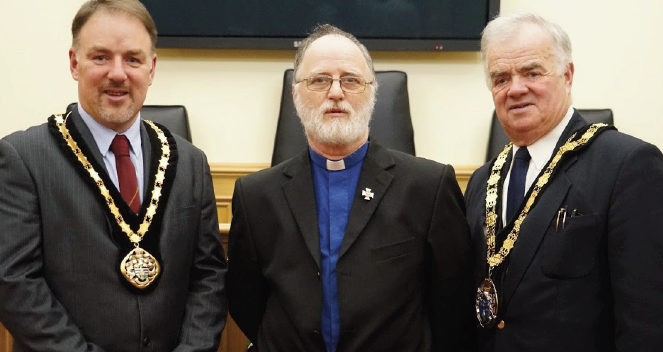 LLANELLI Mayor and County Councillor Bill Thomas is fast becoming one of the most hospitable mayors Llanelli has ever seen.
LLANELLI Mayor and County Councillor Bill Thomas is fast becoming one of the most hospitable mayors Llanelli has ever seen.
That is by no means a reflection on the sterling work of previous mayors, it is just that this mayor appears to be taking every opportunity to fill his parlour with just about every organisation in Llanelli. This week it was the turn of the Llanelli Veterans and the Sea Cadets from TS Echo. He plans to invite the boxing clubs, judo clubs, football clubs and rugby clubs amongst others at future dates.
His aim, he says, is to get people together to socialise, to talk, to share experiences and to network. It is a plan of sorts and amongst all the chaos of a parlour full of Sea Cadets taking advantage of the abundant cans of Coca Cola and the Veterans enjoying a glass of hospitality wine or beer, one would think that this was a recipe for disaster. Not so. It was wonderful to see the young and the old mixing and chatting. Take Frank Goddard, who was in TS Echo in 1942 when they started. TS Echo had won a plaque for being the best unit in Britain in 1943. He said the award was a signed portrait of the King. He told young Cadets Joshua Jones, Charlotte Stroud, Gareth Clancy and Brian Morris that he had done the same things the Cadets were doing today, like learning how to tie knots, and that meeting them had brought back some great memories. Frank joined the navy and served in the Second World War. He said that he thought joining the Cadets was an invaluable experience to socialise and learn. The Cadets told Frank that they admired his bravery and that he was a hero to them. They said that he was welcome to go and visit them at the training centre.
Retired Minister David Payne was also at the event. He is the padre for the Sea Cadets and the Signals Veterans. He said: “I attend their meetings and lead the Armed Forces Day Service. I take the Remembrance Day Service in Ponthenri.” Speaking about the need for armed forces today, he said: “I don’t know what can be done about warfare today. It is different today. Technology has made things simpler and as long as people want power over other people, we are always going to have these conflicts. The church plays a role and always has in supporting the armed forces. There were chaplains throughout the Great War and the Second World War. When you have young people in organisations like the Cadets and Scouts, they get a sense of responsibility and community. Everyone tends to pass on the responsibility to everyone else today. We have become a nanny state in many respects.”
Welcoming the Cadets and Veterans, the mayor said: “This may be the first time we have had the future and the past together here at the Mayor’s Parlour. The veterans fought to preserve the freedom we enjoy today. I want to give people the opportunity to meet, to talk and to share with each other. It is a chance to network and to learn from one another. This is one of many events I have organised this year and there are more to come.”
Veteran John Williams thanked the Mayor and said: “On behalf of the comrades, the old and the bold, I thank you for inviting us to your parlour. When you are serving in the army, you look back, and there was nothing finer to look back to than Llanelli. When you come home, there is nothing finer to look back to than Hong Kong, Burma and Singapore.
I would like to say that all these thoughts that we do have we should remember, but remember most of all that there is no place like Llanelli.”
Bruce Coombes shared his memories of fighting in the Second World War. He said: “I was in the Royal Welsh Fusileers in Normandy and we fought right through to Bremen. I joined in 1944 and I was in Germany after the war finished. I was 17 joining up in the West End of Llanelli. We were front line troops. We landed on the beaches and once you had broken out of Normandy, it wasn’t so bad going through France. We captured a city in Holland and they named the bridge ‘The Royal Welsh Bridge’. We had three battalions and each battalion was a thousand strong. I can’t remember how many men we lost. It took us a year to go from Normandy to Denmark.” Bruce, we were told, had won a lot of medals, including the Legion d’honneur. When we asked Bruce if we could see the medal, he fished through his pockets, which appeared to contain several more medals, before modestly producing what is the highest honour in France.
















Add Comment